A year in the Full Fact office

In January we were still trying to get a correction to the then Health Secretary’s claim that there are “11,000 excess deaths because we do not staff our hospitals properly at weekends”.
The research that was meant to be supporting this claim found 11,000 excess deaths occurred but explicitly says it would be “rash and misleading” to assume these are avoidable. Also, the definition of weekend included Fridays and Mondays.
The Ministerial Code says that when a Minister misleads the House of Commons, he or she should correct any error “at the earliest opportunity”. We wrote to Mr Hunt twice, asking him to correct what he’d said. His office first replied: “The Secretary of State’s statement gave a rough approximation” of the evidence.
We responded by arguing that the claim was “bold and specific about cause and effect and source”, and again requesting a correction. The second time, his office did not reply.
The inaccurate statement remains uncorrected on the official record.
Join 72,953 people who trust us to check the facts
Sign up to get weekly updates on politics, immigration, health and more.
Subscribe to weekly email newsletters from Full Fact for updates on politics, immigration, health and more. Our fact checks are free to read but not to produce, so you will also get occasional emails about fundraising and other ways you can help. You can unsubscribe at any time. For more information about how we use your data see our Privacy Policy.

One of Full Fact’s strengths is channeling external expertise into our factchecks, which are published for a generalist audience. We knew that getting specialist input would be integral to explaining and factchecking the EU referendum debate well.
We asked a group of impartial legal academics from leading universities to help us explain the Prime Minister’s renegotiation deal on the UK’s EU membership.
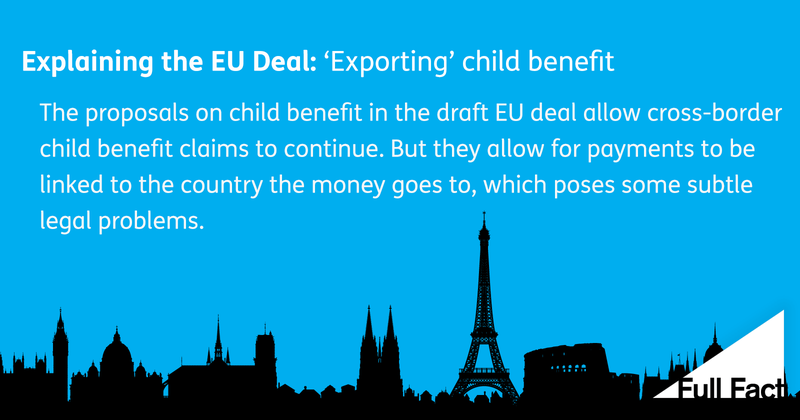
We edited, sourced and promoted the articles they wrote for us on the most important parts of the deal, from whether it was legally binding to how the much-discussed emergency brake would work.
Many thanks to the wonderful Professor Catherine Barnard for leading the group of lawyers, and being on hand at most hours of the day and night to help with all our questions.
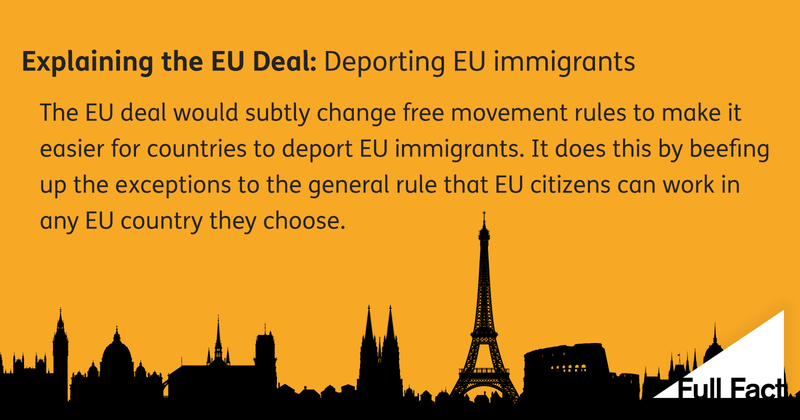
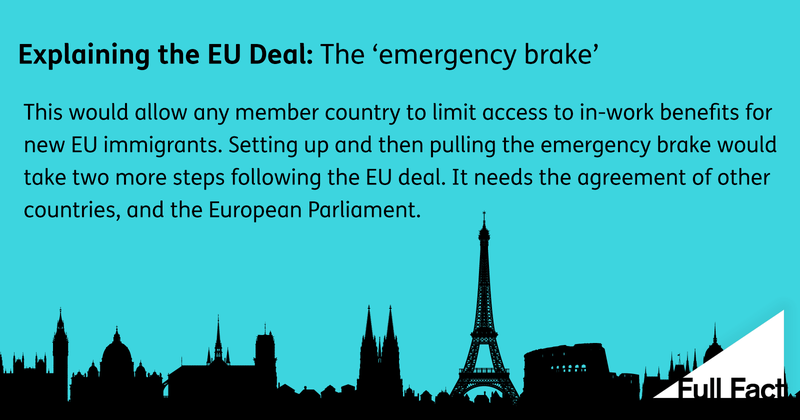

Publishing factchecks where everyone can access them is important - that’s why we work with newspapers and broadcasters as well as putting all our findings on our website.
But we also work behind the scenes to help improve accuracy and hold the media and politicians to account. Full Fact is relatively unusual among factcheckers globally in seeking corrections and improvements to systems that affect the quality of public debate.
Phoebe Arnold, our Head of Impact and Communications, runs this side of our work. In March she flew to Buenos Aires to deliver training to the Argentinian factchecking organisation Chequeado in how to achieve impact with factchecking.
While she was there, she also met data journalists from the national newspaper La Nación, visited staff at the think tank CIPPEC, and was interviewed by Argentina’s leading investigative journalist, Hugo Alconda Mon. Watch the interview below.
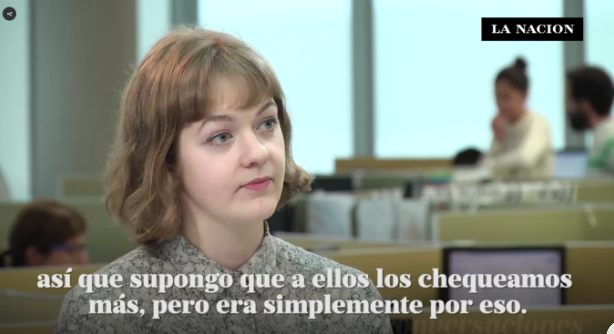
At home, it was a good month too: we also got the Prime Minister to correct the official record on a claim about schools; were cited by the British Medical Journal regarding our query of Jeremy Hunt’s weekend deaths claim; and were featured in the Economist as a source for facts on the EU debate.

We launched a crowdfunder to support our EU referendum work. By the end of five weeks, we raised £43,260 from 1371 individual crowdfunders who wanted us to factcheck the EU referendum. Crowdfunder (the platform) loved our project so much that they featured us as a star project and added an extra week to the usual four weeks most projects get to hit their target.
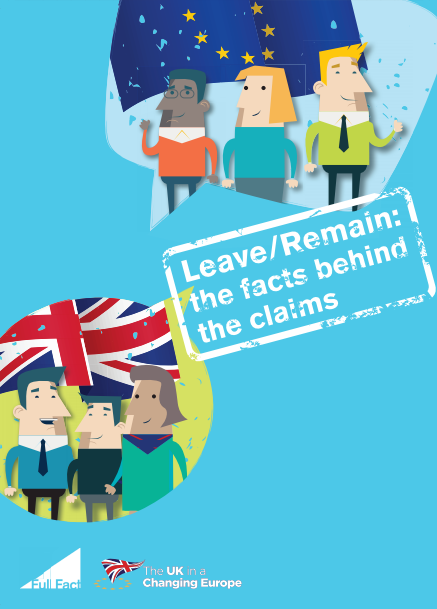
In that month we also launched a report factchecking the key EU debate claims with our partner, UK in a Changing Europe - an award-winning group of academics led by Professor Anand Menon.
ITV made a series of five short films using the report, and it was featured by the Today Programme, The Sun, the Guardian, BBC Radio 5 Live, BBC Wales, the Press Association, and Sky News Tonight.

Live-factchecking, plus a correction to a House of Lords report
We sat on the expert panel for the Intelligence Squared Brexit Debate. The debaters were former Deputy Prime Minister Nick Clegg MP and Labour MP Gisela Stuart. We checked their claims on the EU budget, immigration, and how laws are made.
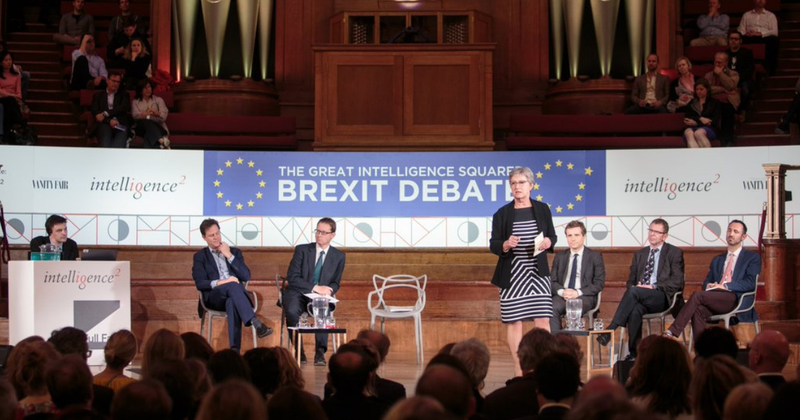
We also secured a correction from the House of Lords European Union Committee on the number of Britons living in the EU. The report originally claimed that the number was 2 million, but it was closer to 1.2 million. This correction to a major source meant that it was easier for us to approach the media and ask them to correct their coverage.
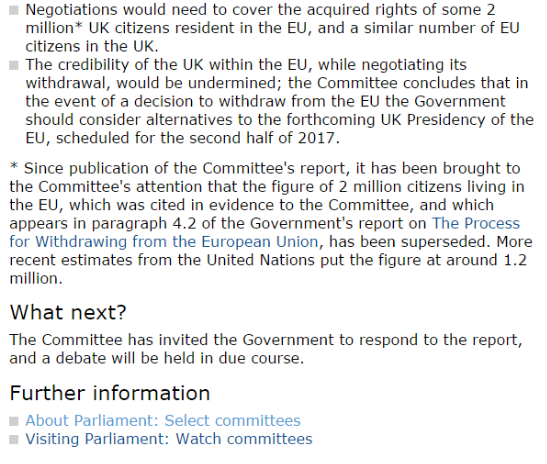

As the referendum drew nearer, our Director Will Moy and researchers—Amy Sippitt, CJ McKinney, Joseph O’Leary, Claire Milne and Richard Braham—were more in demand from the media than ever before.
We were on Good Morning Britain, ITV News, local and national BBC programmes and LBC; and our work was used everywhere from the Big Issue to the Telegraph to Mumsnet.
Throughout April, May and June, our media log grew by a 100 entries, including recordings of interviews, briefings, and citations. We were responding daily to varied requests, such as “Who’s right on the legal status of the EU deal - Cameron or Gove?”, “What’s the effect of EU workers on the economy?”, and “What has the EU ever done for us?”—as well as requests to live-factcheck the TV debates.
Ipsos Mori launched their EU special Perils of Perception survey on what British people get wrong (and right) about the EU. For example, Brits massively overestimate how many EU-born people live in the UK. We guess that EU citizens make up 15% of the total UK population—but the reality is 5%.
We had helped Ipsos Mori to find the realities to questions about how much we pay into the EU, and the proportion of Child Benefit going to families in other European countries, and EU regulations. Ever heard the claim that the EU regulates the how bendy bananas can be, or has banned excessive barmaids’ cleavages? Find out whether that’s fact or fiction here.

Post truth politics
In July we reflected on what we’d learned from the referendum campaign, and fielded readers’ emails, tweets and phone calls about ideas prompted by the referendum. These ranged from arguments to make it illegal to lie about facts in politics, calls for an official adjudicator of political campaigns, and a petition to spend that £350m on the NHS in the event of a Leave vote.
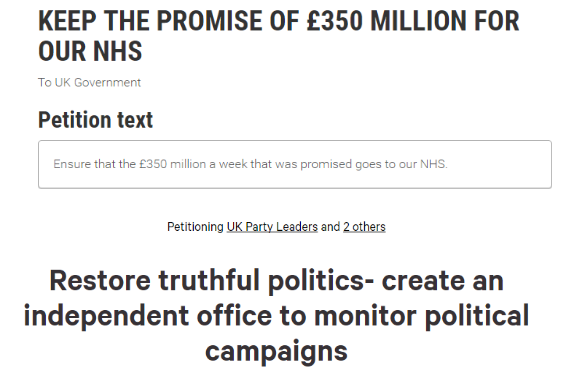
We knew we should not get distracted by these proposals: especially ones that would draw us into an argument about the referendum result, or make it seem as if we were taking sides.
Full Fact has always been about improving the structures that hold people to account so that public debate is accurate. It’s because of Full Fact that Ministers have to publish ad hoc statistics before using them in public; that the Department of Health now produces a list of data sources alongside Ministerial speeches; and that The Sun and Daily Mail set up corrections columns. We weren’t about to divert from our successful strategy of improving systems to make our and others’ lives easier.
What we did realise, however, is that we were no longer going to have the challenge of making the case that misinformation is bad for public decisions and bad for public trust in democracy, politics and institutions. Our job now was to make the most of the ‘post truth’ mood, getting people to act while we had their attention.

BBC Report
Full Fact rarely makes statements of opinion. In our factchecks we leave it to readers to make up their own minds. But on issues that affect our work directly, such as statistics policy or purdah rules, from time to time we submit evidence and recommendations to committees or inquiries, always drawing on specific examples to make a case.
At the end of 2015 the BBC Trust commissioned a report into how accurately and impartially the BBC reports statistics. We gave written and oral evidence to the review, drawing on our evidence base of hundreds of factchecks and experiences of working with the BBC since 2010.
The final report addressed many of our concerns. We wrote to the BBC Executive with our response. In this we argued that the BBC’s editorial guidelines should be changed so that when the UK Statistics Authority deems a statistical claim misleading this is adequately reflected in BBC coverage. We do not yet know what the result will be.


International factcheckers' code of principles
The third global factcheckers’ conference took place in Buenos Aires in June. Full Fact’s Phoebe Arnold and Africa Check’s Peter Cunliffe-Jones kicked off the design of a new code of principles for factcheckers around the world. In some of countries even politicians are claiming to be factcheckers: many factchecking organisations agreed that we needed something to differentiate ourselves and help people distinguish genuine factchecking from partisan factchecking with an agenda.

The Code covers transparency of methodology, sources, funding; and openness about corrections. There are currently 43 signatories.
In December Facebook announced they would be working with third-party factcheckers which are signatories of the Code of Priniciples, as part of their response to the problem of fake news. A US-only pilot has now begun.
Also in September, Full Fact’s Director Will Moy was part of a panel at the Institute for Government event about the public being sick of experts. Talking about Full Fact's effect on newsrooms, Oliver Wright the policy editor of the Times gave us the encouragement we needed: “Full Fact has made us all think a little bit harder”. Watch the video here or below. (Warning: it's a long one.)

Google News factcheck label and LBC video partnership
In October we announced that our factchecks had begun to be highlighted in Google News searches. Google had invited us to be part of this pioneering work: we were the first UK source for the factcheck label.
Google News already labels articles by type, such as "Opinion" or "Local Source". Thanks to the rise in popularity of factchecking, they're now including "Fact Check" as one of the categories.
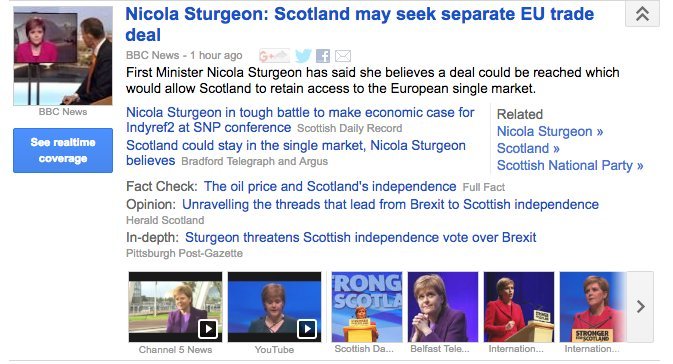

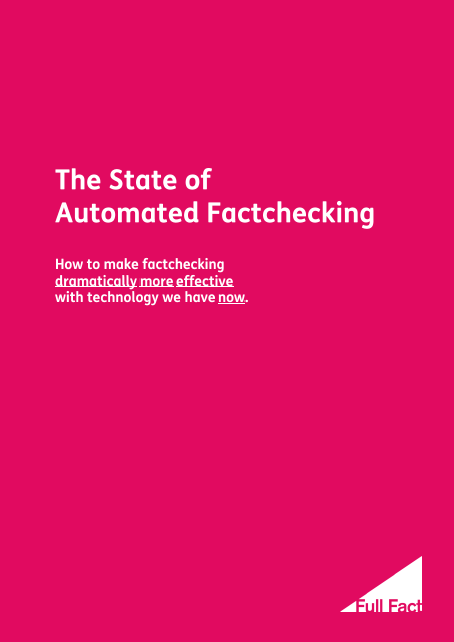
In August we released our white paper The State of Automated Factchecking, claiming that within 12 months, and with the right funding, we could have an automated factchecking tool in the palm of every willing journalist.
Three months later, we won funding from the Google Digital News Initiative to build automated factchecking tools.
A lot of people on both sides felt lied to during the referendum. What's worse is that many people think it's inevitable they will be lied to. Only about 1 in 5 of us generally trust politicians or journalists to tell the truth. We all need tools that help us choose when to trust and when not to trust claims we hear. Otherwise, it’s too easy just to switch off completely and be cynical about everything.

The Need to Know project
Last week we launched the Need to Know project with the people who fund and produce public information in the UK to make a plan for filling the gaps in data and analysis.
We’re lucky to have access to great public information here in the UK. Our statistics are independent and increasingly well-communicated. We have a thriving social and economic research network, and a strong community of people who care about making sure public decisions are based on the best information available.
We're working with three other organisations. The Economic and Social Research Council (ESRC) is the UK's largest organisation for funding research on economic and social issues. The UK Statistics Authority is the regulator which safeguards and promotes official statistics that serve the public good. The House of Commons Library provides impartial, publicly available research and briefings for MPs. And Full Fact is the UK's independent factchecking organisation.
In the last few weeks we've also released hub and debate pages across almost all of our areas. You can see examples at Immigration and Asylum seekers and refugees.

What a year!
It’s been an exhilarating year for us: but also a frustrating one.
We’ve found new ways to get to grips with important factual debates. Our thorough approach to factchecking a debate—starting with the junior doctors dispute—meant we well-prepared to respond quickly to new claims about NHS spending.
Our series on the EU basics was hugely popular because it answered people’s most googled questions, which we might not have thought of ourselves.
Our comprehensive factchecks of the government’s EU leaflet, the Electoral Commission voting guide and both sides’ ‘facts’ leaflets were presented concisely and people were able to compare the leaflets with the factchecks alongside.
Our EU membership fee article tackled one of the biggest issues of the referendum, and was viewed almost 700,000 times. We spent hours perfecting our conclusion, and thinking what image we could use to give people an immediate sense of how the membership fee and the rebate work. Here's what we found out by factchecking claims about the membership fee.
We’ve built new partnerships with impartial experts: we are hoping to work again with UK in a Changing Europe and the Centre for European Studies, as well as continuing to work with our excellent election partners.
Our facts and factchecking reached more people than ever before: we’ve been in the media over 200 times, and on Facebook reached either 13 million or 400,000 people, depending on how you look at it (we were in 13 million newsfeeds, and 400,000 people actually interacted with our material).
On the other hand….
The week before the referendum, Ipsos Mori asked people whether they believed the claim that Britain sends £350m a week to the EU. 78% of respondents had heard of it, and of those, 47% thought it was true. Despite all of our concerted factchecking, as well as the UK Statistics Authority’s statement, almost 50% of people believed Leave’s inaccurate £350m figure.
We recognise the need to do more, to embolden others to do more, and to push forward the field not just in the UK but worldwide. To support on us on this journey please consider becoming a donor. Full Fact must grow if it is to make a bigger change. Fake news and misinformation is a problem we will have to tackle from all angles. That's why in 2017 we've lined up converastions with the data providers, the regulators, the media, the government and its departments, the social media platforms, developers who want to help us build automated factchcecking tools and of course: you. We will not stop serving you factchecks and laying out the whole story, for you to make up your own mind.
From everyone at Full Fact, we wish you a fantastic Christmas and New Year.
Here's hoping 2017 is the year we make an even bigger dent in fake news and post truth politics, and that our efforts better anchor public debate in reality.